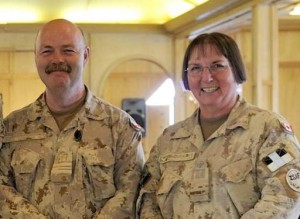by the deployed captain-chaplains of TF 1-10
A system of differing roles and responsibilities is nothing new to Anglican’s within the church or the military; but sometimes the question is posed “just what does the chaplain who is a Major do?” The Afghanistan Roto Task Force 1-10 (TF 1-10) chaplain team leader, Major the Reverend Maude Parsons-Hörst, filled many different roles in a recent deployment to Afghanistan. Starting with an Imposed Restriction (IR) posting to Petawawa, Padre Parsons-Hörst arrived with a positive attitude wishing to foster a team spirit that would get us through our tour. Her focus was to allow each team member to ‘play to their strengths’ and encourage growth. Through our autumn deployment planning and throughout our participation in Exercise MAPLE GUARDIAN held in California, January through March 2010, Padre Parsons-Hörst was a facilitator between the team and Canadian Military Training Centre (CMTC) chaplain staff, an advocate for the team within the Petawawa base, and in communication with the “then deployed” Team Leader “chaplain-majors” in theatre asking questions and seeking lessons learned information.

When the TF 1-10 team arrived in theatre, the TFK Senior Chaplain, Major Andre Gauthier, was already in place. Part of the task of the TF 1-10 team leader was to link with and support this ‘overall chaplain team leader’ which was accomplished through facilitating team meetings, participating in Next of Kin (NOK) visits, filling the TFK Major role while he was on HLTA, taking silent hour duty calls on a weekly rotational basis etc etc. Part way through the TF 1-10 tour, Major Grahame Thompson came in as the TFK Senior Chaplain. Major Parsons-Hörst provided the continuity link for this transition as she continued her previous supportive roles.
Both majors provide links with the chaplain net back in Canada. The regular work of Monthly Reports, Professional Development Reports (PDR) and Chaplain Evaluation Reports (CER) all continue, as do chaplain postings and course requests. The Majors do this mentoring/administrative “office type work” while continuing to serve as chaplain to their own units, the Operational Mentor and Liaison Team (OMLT) – pronounced as omelette, Military Police, and the Task Force Headquarters (TFK HQ) staff. They also provide chaplain support to Kandahar Air Field (KAF) based soldiers and Units while other chaplains are working outside the wire. With regard to the deployed chaplain team, the majors supervise with professional critical thinking; think and act in terms of the larger team; anticipate and adapt to changes and challenges, and exemplify professional integrity in all they do.
Any special visits such as NOK family or VIP’s were a welcome and meaningful ministry of the senior chaplains. Requests were received throughout the tour for special services such as dedications of plaques to the TFK Memorial or services for anniversaries of a death by a family member working in KAF. Attendance and presentations at weekly Coalition Chaplain meetings as well as representing the Canadian chaplain team at Coalition Ramp Ceremonies (often held in the early morning hours) all fell within the majors’ responsibilities. Regular Sunday church services also were frequently handled by the majors as captain chaplains, scheduled for services, sometimes found themselves called away for operational needs.
The pastoral support provided by Major Parsons-Hörst in remembering the chaplains who were “out and about” in prayer and connecting with them through email, played a vital part in energizing the ministry of the team. Simply keeping track of who was where and who was available was a challenge at times, but essential to support the ministry needs of our deployed members
Sometimes it is easy to look at the role another person plays and be the armchair quarterback. It is good to remember that much more goes on behind the scenes of anyone’s work than first glance might have you believe. Heading up and mentoring TFK and TF 1-10 chaplain teams certainly was major work.
Interested in keeping up-to-date on news, opinion, events and resources from the Anglican Church of Canada? Sign up for our email alerts .
